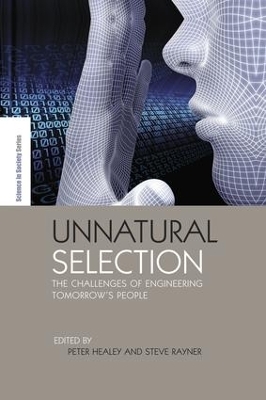
Unnatural Selection
The Challenges of Engineering Tomorrow's People
Seiten
2014
Routledge (Verlag)
978-1-138-00208-1 (ISBN)
Routledge (Verlag)
978-1-138-00208-1 (ISBN)
With ever-advancing scientific understanding and technological capabilities, humanity stands on the brink of the potential next stage of evolution: evolution engineered by us. Nanotechnology, biotechnology, information technology and cognitive science offer the possibility to enhance human performance, lengthen life-span and reshape our inherited physical, cognitive and emotional identities. But with this promise come huge risks, complex choices and fundamental ethical questions: about evolution; about what it is to be human; and about control over, and the distribution of benefits from, new technology.
Written by a range of experts in science, technology, bioethics and social science, Unnatural Selection examines the range of technological innovations offering lives that purport to be longer, stronger, smarter and happier, and asks whether their introduction is likely to lead to more fulfilled individuals and a fairer world. The breadth of approaches and perspectives make important reading for anyone who cares about the implications of humanity engineering its own evolution.
Written by a range of experts in science, technology, bioethics and social science, Unnatural Selection examines the range of technological innovations offering lives that purport to be longer, stronger, smarter and happier, and asks whether their introduction is likely to lead to more fulfilled individuals and a fairer world. The breadth of approaches and perspectives make important reading for anyone who cares about the implications of humanity engineering its own evolution.
Peter Healey is Associate Fellow at the Institute for Science, Innovation and Society, University of Oxford. Steve Rayner is James Martin Professor of Science and Civilization at the Institute for Science, Innovation and Society, University of Oxford, a member of the Royal Commission on Environmental Pollution, and Honorary Professor of Climate Change and Society, University of Copenhagen.
Introduction * One World or Several? * The Nature of Human Natures * Longer? * Stronger? * Smarter? * Happier? * Fairer? * Governable? * Postscript: Choosing our Biological Future * Index
| Erscheint lt. Verlag | 15.8.2014 |
|---|---|
| Reihe/Serie | The Earthscan Science in Society Series |
| Verlagsort | London |
| Sprache | englisch |
| Maße | 156 x 234 mm |
| Gewicht | 408 g |
| Themenwelt | Studium ► Querschnittsbereiche ► Geschichte / Ethik der Medizin |
| Studium ► Querschnittsbereiche ► Prävention / Gesundheitsförderung | |
| Naturwissenschaften ► Biologie ► Genetik / Molekularbiologie | |
| Naturwissenschaften ► Geowissenschaften ► Geologie | |
| Naturwissenschaften ► Geowissenschaften ► Geophysik | |
| Recht / Steuern ► Allgemeines / Lexika | |
| Recht / Steuern ► EU / Internationales Recht | |
| Technik ► Umwelttechnik / Biotechnologie | |
| ISBN-10 | 1-138-00208-9 / 1138002089 |
| ISBN-13 | 978-1-138-00208-1 / 9781138002081 |
| Zustand | Neuware |
| Informationen gemäß Produktsicherheitsverordnung (GPSR) | |
| Haben Sie eine Frage zum Produkt? |
Mehr entdecken
aus dem Bereich
aus dem Bereich
Die Geschichte eines Weltzentrums der Medizin von 1710 bis zur …
Buch | Softcover (2021)
Lehmanns Media (Verlag)
17,95 €
von der Antike bis zur Gegenwart
Buch | Softcover (2024)
C.H.Beck (Verlag)
12,00 €


